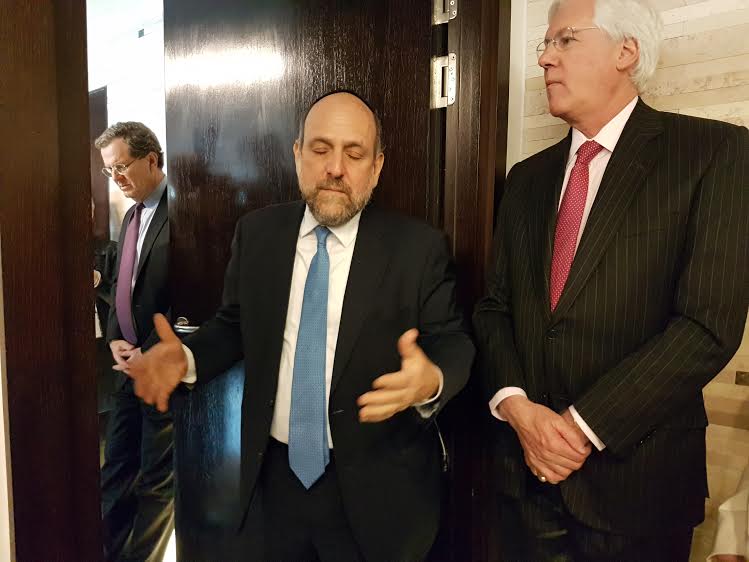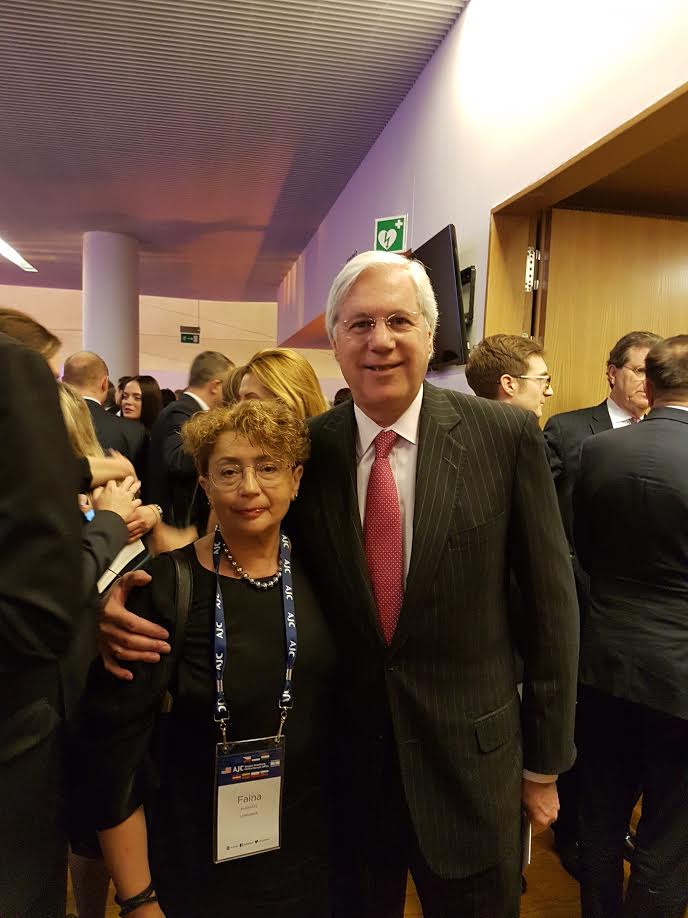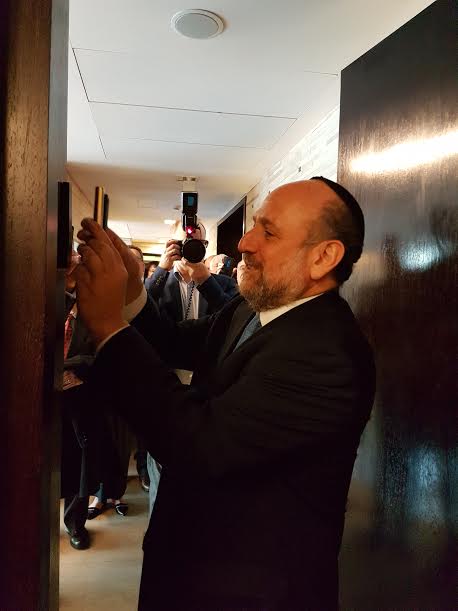
by David Harris
March 22, 2017
On March 27, AJC, the global Jewish advocacy organization, opened its newest international office in Warsaw. Named AJC Central Europe, it covers seven countries – Czech Republic, Estonia, Hungary, Latvia, Lithuania, Poland, and Slovakia. AJC also has such offices in Berlin, Paris, Brussels and Rome.
AJC president John M. Shapiro gave a speech at the opening of the Warsaw office. Lithuanian Jewish Community chairwoman Faina Kukliansky attended the opening ceremony. Both appear in the photograph below.


Polish Rabbi M. Schudrichhangs a mezuzah on the doorway of the AJC office.
Why such an office?
There are several timely and pressing reasons for intensified engagement.
These nations form one-fourth of the current membership of the European Union, hence they have an important voice in Brussels, which will only grow with the anticipated exit of the United Kingdom from the EU in 2019.
They are all deeply committed to the trans-Atlantic partnership and their bilateral links with Washington, and, of course, they are valued NATO members.
They also have robust ties with Israel, in some cases described as strategic partnerships.
Moreover, since the fall of the Berlin Wall and the end of the Soviet occupation, all have witnessed a renewal of Jewish life and a reexamination of their Jewish history, a process which continues to the present day.
And last but by no means least, their geographical location elevates their importance not only for Europe, but also, of course, for the United States – and for all friends of the defense of European and trans-Atlantic institutions.
At this time of uncertainty and unpredictability in international affairs, intensifying our dialogue, and identifying new areas for cooperation, becomes a matter of the highest priority.
Why AJC?
The organization has long been steadfastly committed to the deep bonds, defined by both values and interests, between Europe and the United States; to the process of European integration as the most ambitious and successful peace project in modern history; to the enduring importance of NATO as a collective security pact; and to the defense of democratic values and protection of human dignity.
AJC is not new to Central Europe. To the contrary, our engagement goes back decades and is absolutely unique in the Jewish world, so the establishment of an office is the natural outgrowth of longstanding involvement and activities in many spheres.
Here are some of the highlights:
As early as the 1970s, AJC co-sponsored the Polish American – Jewish American Council in the U.S. This was the first forum to engage leaders of both communities. It sought to deal with difficult issues that had at times divided the two groups, as well as identify areas of joint action, which included a successful call on the U.S. government to extend the visas of Poles in America fearful of returning to their homeland and facing possible arrest after martial law was imposed in December, 1981.
Having been the first Jewish organization to call for recognition of German unification, AJC saw the enormous opportunities to write a new chapter in European history by engaging Central and East European countries in their post-1989 transition to democracy and, later, supporting their EU and NATO aspirations.
Indeed, while the United States hesitated to extend formal diplomatic recognition to the three Baltic states, on August 27, 1991 AJC wrote to president George H. W. Bush urging him to do so. We said: “We respectfully ask you to move decisively toward early, formal recognition of the Baltic Republics by the United States. We believe that our country should be among the vanguard of States to welcome Latvia, Lithuania and Estonia – formally and diplomatically – to the community of nations.” Two weeks later, in September of 1991, Washington took the historic step.
In 1995, AJC partnered with the Warsaw-based Forum for Dialogue among the Nations to establish the first Polish-American Jewish exchange program, which has continued on an annual basis and now boasts an alumni community of hundreds of Poles and American Jews dedicated to fostering strong ties between them.
In 1997, AJC was the only Jewish group invited to testify before the U.S. Senate Foreign Relations Committee on behalf of the expansion of NATO to include the Czech Republic, Hungary and Poland. This came after we had written to president Bill Clinton as early as March, 1994, urging consideration of NATO membership for these three countries.
“AJC has really made a vital contribution to the debate on this issue.”
Following our Senate testimony, Jeremy Rosner, special advisor to the president and secretary of state for NATO enlargement ratification, wrote: “Your testimony was tremendously effective and compelling. Several people in the room including Senator (Jesse) Helms’s staff remarked to me later that they found your testimony especially powerful. .. AJC has really made a vital contribution to the debate on this issue.”
And in the testimony, we planted the seeds for a further round of NATO expansion, in response to questions from senator John Kerry, then a member of the Senate committee: “It is important to keep very much alive NATO’s openness…to further waves of expansion. To do otherwise is to dash the hopes of tens of millions of Europeans, from the Baltics to the Balkans, that their future might include membership in NATO, and to imply a re-creation of European spheres of influence, a profoundly destabilizing step that could have unintended, even unforeseen, consequences.”
In 2004, the Government of Poland and AJC dedicated the Belzec Memorial and Museum. An unusual partnership between a sovereign state and a non-governmental organization, the years-long project turned the barren site of a Nazi German death camp where an estimated 500,000 Jews had been killed in less than a year into a protected place of memory and education.
In the presence of over one thousand invited guests, including Holocaust survivors, diplomats, and a large contingent of officers from the Israel Defense Forces, Polish president Aleksander Kwasniewski spoke and later laid a wreath, the U.S. ambassador read a letter from president George W. Bush and the Polish bishop of Zamosc read a message from Pope John Paul II.
And in 2012 after president Barack Obama’s unfortunate misstatement on the occasion of conferring posthumously the Presidential Medal of Freedom on Jan Karski, the Polish wartime hero, about a “Polish death camp,” AJC wrote in the New York Times: “Poland was the first target of the Nazi military juggernaut. Many Poles fought courageously, first on the battlefield, later in the underground, against the Nazi occupation of their country. The Nazis, not the Poles, built the infamous death camps, including Auschwitz, where many Polish Catholics in addition to countless Jews were sent.”
Why Warsaw?
Frankly, several capitals in the region expressed interest in hosting the office. Any one of them would have been an attractive venue for our operation. But Warsaw made the most sense. Poland is the largest of the seven countries and it is geographically at the heart of the region. While there are many layers of Jewish history in each of these nations, Poland occupies a unique place in the Jewish world, having been home before the war to millions of Jews, an astonishingly vibrant Jewish culture and every school of Jewish political, cultural and religious thought. And while AJC has maintained close ties with all the countries in the region, Poland looms particularly large, given our engagement – in Poland, the United States, and at the Vatican – well before the end of Communism in 1989.
We could not be more excited to be opening the AJC Central Europe office in Warsaw, and we earnestly hope it will contribute to the further deepening of ties among the seven nations, the United States, Israel and the Jewish people.
The legendary 19th century Polish poet Adam Mickiewicz wrote: “The nectar of life is sweet only when shared with others.” Our goal is to help prove his words as accurate in the 21st century through the work of our new office as when he first wrote them.
Full story in Poland Today.

